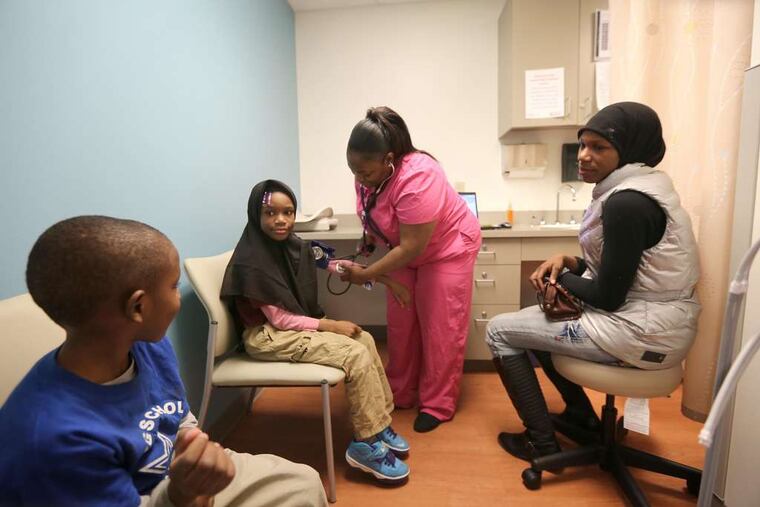N. Phila. health center to be one-stop resource
Just three days before its grand opening, the Stephen Klein Wellness Center had patients sitting in the waiting room even as workmen washed the windows and scraped the last bits of tape off the high ceiling with a pole.

Just three days before its grand opening, the Stephen Klein Wellness Center had patients sitting in the waiting room even as workmen washed the windows and scraped the last bits of tape off the high ceiling with a pole.
"It's a little crazy getting ready," Monica Medina McCurdy of Project HOME said Friday morning. She and everyone involved with the Wellness Center had plenty to do before Monday's grand opening: They had to turn a brand-new, one-story, 28,000-square-foot building into one-stop shopping for low-income and homeless patients in one of North Philadelphia's poorest regions.
When it opens next week, the center will offer medical and behavioral health treatment and much more: showers, laundry facilities, legal services, and an emergency food pantry.
"My vision is it will be a place where people feel safe and listened to and feel respected," said Medina McCurdy, Project HOME vice president of health-care services.
The center, at 2144 Cecil B. Moore Ave., opened in late December and has seen 600 patients since. When it's at full capacity, the center will serve about 18,000 people a year and offer even more services, Medina McCurdy said.
It's still a work in progress: A prenatal care center will open next month and dental services and a pharmacy will open by summer. Administrators are moving through paperwork that will increase the number of insurers the center accepts, although it treats the uninsured.
The center was 19 years in the making if you count back to when its predecessor began, a small wellness center run out of St. Elizabeth's, a former rectory a few blocks away at 1850 N. Croskey St. The seed funding for the wellness center came eight years ago from local real estate developer Stephen Klein, and construction of the center took just 10 months.
At the center, Medina McCurdy said, doctors will be able to better address causes of patients' complaints, such as homelessness, stress, and nutrition.
A doctor can "prescribe" a visit to the emergency food pantry. Physicians across disciplines will be able to coordinate with one another about patients.
"It's the concept of the power of relationships," said Project HOME executive director Sister Mary Scullion. "They see not just physical wounds but the invisible wounds of racism, of marginalization and of violence."
Relationships have proved key for the wellness center: Some of the original Thomas Jefferson University medical students and doctors who partnered with St. Elizabeth's 19 years ago - and who have devoted most of their careers to caring for the homeless and underserved communities - moved over to the center. St. Elizabeth's, now called St. Elizabeth's Recovery Residence, is a housing center for those who have been homeless.
The center occupies a corner of 21st Street and Cecil B. Moore Avenue, a sleek new development across from falling-down buildings. Though the site was chosen for its accessibility - it's a gateway to North Philadelphia easily accessible by car and public transportation - the corner has history. In 1964, it was the site of racially charged riots that brought fires in a street that was once a popular market hub. The neighborhood never quite recovered.
Now, the North Philadelphia region the wellness center aims to serve is one of the city's poorest. Nearly half of the adults and children live below the poverty line, and unemployment is about twice the city rate.
"The people in the neighborhood really desire peace and want the opportunity for them and their children to live a good quality of life," Scullion said.
The ladder used to help reach the tape on the ceiling was taken down and carried past the chairs of patients and the artwork on the waiting-room wall. The waiting room, bright with sunlight, is decorated with pictures of benefactors and a sculpture hanging from the ceiling at the entrance.
"The beauty - look at the photos, look at the artwork," Scullion said. "You can't walk in here and feel hopeless."